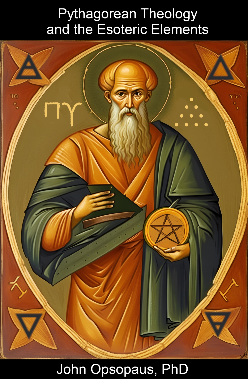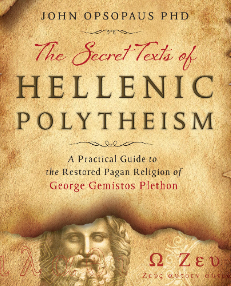Twenty-six centuries ago Pythagoras founded an initiatory secret order in which he taught the true nature of the gods and their connection to the numbers, understood as spiritual principles. His doctrines were based in part on the teachings of his master, Pherekydes, and of the Persian Magi, as well as Zoroastrianism and the Orphic Mysteries. Pythagoreanism continued as an esoteric tradition in the West, significantly influencing Plato and later Platonists, and providing a basis for the spiritual practices of the late antique Neoplatonism of Emperor Julian, Iamblichus, Proclus, and others. Especially after its rediscovery in the Italian Renaissance, Pythagoreanism, provided the esoteric heart of the spiritual, mystical, and magical traditions of Europe and the Near East.
Part I of this book presents a summary and synthesis of Pythagorean theology, covering theogony, or the birth of the gods, the nature of the goddesses and gods themselves, the Ineffable One or First Principle, and theurgy, the sacred ritual by which one may communicate with the gods and daimons and ascend to union with the One.
Part II presents the esoteric doctrine of the four elements (earth, water, air, and fire), which are much more than earthly matter. The four elements were discovered by Empedocles, a fifth century BCE Greek from Sicily. He was a Pythagorean and in his own time was viewed as a prophet, healer, magician and savior. His beliefs and practices were built on ancient mystery traditions, including the Orphic mysteries and the underworld mysteries of Hekate, Demeter, Persephone and Dionysos. Empedocles, in his turn, was a source for the major streams of Western mysticism and magic, including alchemy, Graeco-Egyptian magic, Neoplatonism, Hermeticism and Gnosticism. Part II presents the esoteric doctrine of the four elements, which provides a basic framework underlying these and other spiritual traditions.
Part I of this book presents a summary and synthesis of Pythagorean theology, covering theogony, or the birth of the gods, the nature of the goddesses and gods themselves, the Ineffable One or First Principle, and theurgy, the sacred ritual by which one may communicate with the gods and daimons and ascend to union with the One.
Part II presents the esoteric doctrine of the four elements (earth, water, air, and fire), which are much more than earthly matter. The four elements were discovered by Empedocles, a fifth century BCE Greek from Sicily. He was a Pythagorean and in his own time was viewed as a prophet, healer, magician and savior. His beliefs and practices were built on ancient mystery traditions, including the Orphic mysteries and the underworld mysteries of Hekate, Demeter, Persephone and Dionysos. Empedocles, in his turn, was a source for the major streams of Western mysticism and magic, including alchemy, Graeco-Egyptian magic, Neoplatonism, Hermeticism and Gnosticism. Part II presents the esoteric doctrine of the four elements, which provides a basic framework underlying these and other spiritual traditions.
Available from Amazon in paperback, hard cover, and kindle ebook formats, and as an Audible audiobook (with a synthetic voice). Note that the audiobook does not include the diagrams and some of the ancient Greek words.


